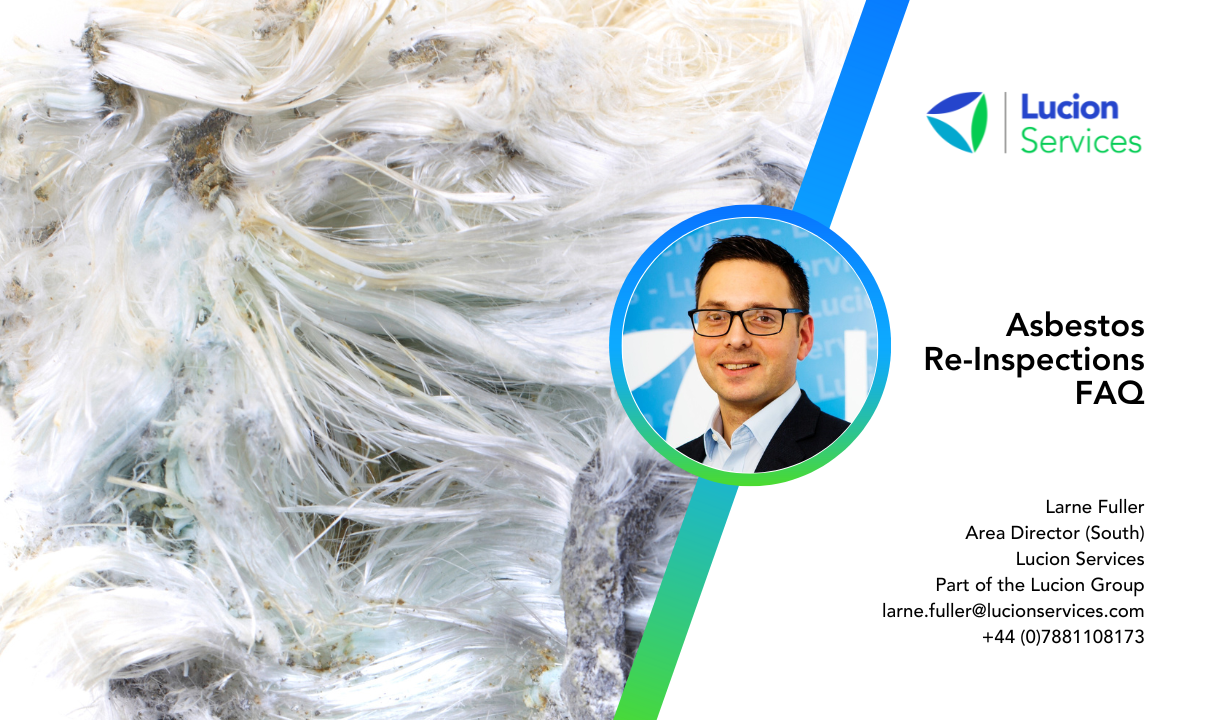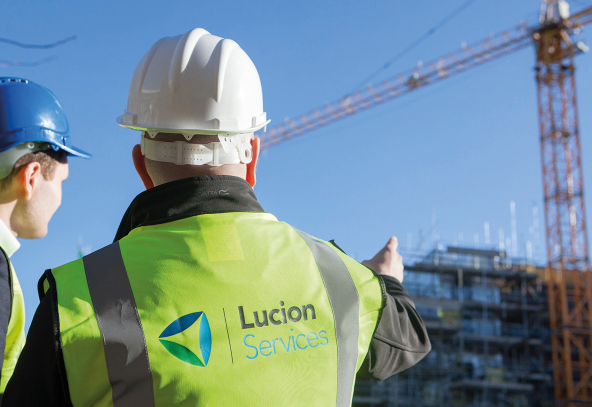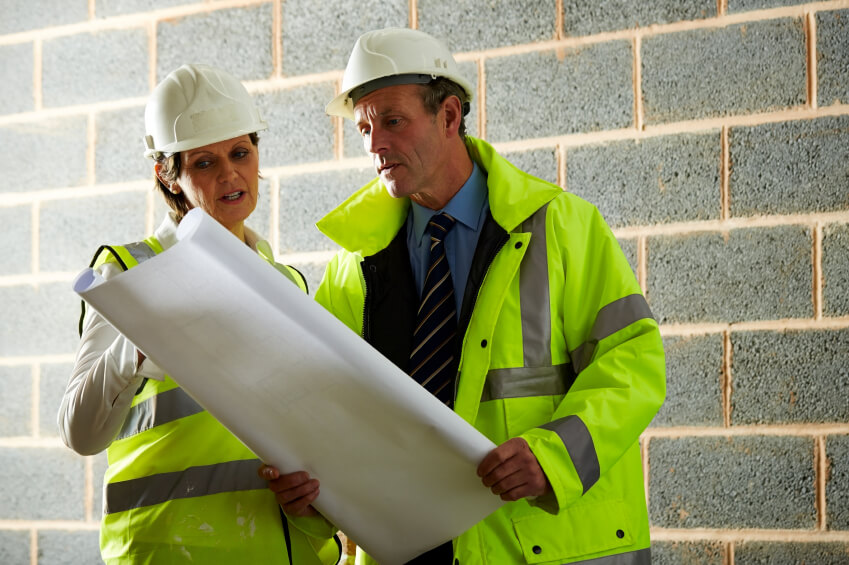Asbestos Re-Inspection Surveys Top Ten FAQs
12 July 2023
The BBC recently highlighted 16 schools in Gurnsey were found to have asbestos-containing materials. The State of Guernsey commented on the findings stating;
"So long as asbestos-containing materials are maintained in good condition and are not disturbed they do not present a significant risk to health[.] The regular inspections[...] ensure that the risk is monitored and controlled."
Whilst the affected schools have been commended for their management of this once coined ‘wonder material’, Lucion Services Area Director Larne Fuller has taken the opportunity to reiterate the importance of an effective asbestos re-inspection program and provides insight into our clients' top 10 FAQs.
Under the Control of Asbestos Regulations 2012, Approved Code of Practice and guidance document L143 states that "Any identified or suspected asbestos-containing material (ACM) must be inspected and its condition assessed periodically, to check that it has not deteriorated or been damaged”. But what does ‘periodically’ mean and how do I know if I need an asbestos re-inspection survey?
To help demystify asbestos re-inspection surveys, we’ve put together our top 10 FAQs from our clients.
What is an asbestos re-inspection survey?
An asbestos re-inspection survey is designed to allow the duty holder to monitor and record the condition of any previously identified asbestos products within a building.
Like any building material, asbestos-containing materials are also subject to potential damage and degradation. As an asbestos product degrades it can be more likely to become a hazard to health, therefore it should be inspected at regular intervals to ensure its condition has not deteriorated.
For this type of survey to be undertaken, an existing asbestos management survey, asbestos register, and Asbestos Management Plan should already be in place.
How often should I conduct an asbestos re-inspection survey?
As a duty holder, under the Control of Asbestos Regulations (CAR) 2012 you are required to manage your asbestos risks as far as reasonably practicable. Effectively managing your asbestos risks is imperative to protecting your building occupants, environment, and organisation from the risks of asbestos. INDG223 Managing Asbestos In Buildings: Brief Guide Step 6 Keep Your Records Up To Date HSE states that asbestos re-inspections should be conducted every 6-12 months depending on your asbestos survey report. Should your asbestos-containing materials be identified as high risk, re-inspections may be required more frequently in order to ensure the risk is being correctly managed along with reviewing risk assessments and control measures.
Should your asbestos-containing materials be identified as high risk, re-inspections may be required more frequently in order to ensure the risk is being correctly managed along with reviewing risk assessments and control measures.
In the Approved Code of Practice (143), your asbestos management plan, which includes records and drawings, must undergo an annual review. If there is any indication of changed circumstances, such as a building's change of use, ongoing construction work, removal or repair of asbestos-containing materials (ACMs), etc., the plan, along with its records and drawings, should be promptly reviewed and adjusted accordingly.
Is an asbestos re-inspection survey relevant to my building?
There are two key things to consider when deciding if an asbestos re-inspection survey is relevant to your building:
Firstly, does your existing asbestos survey report contain asbestos? If yes, then you are required under the Control of Asbestos Regulations 2012 to have your asbestos re-inspected to assess its condition. Asbestos-containing materials are subject to degradation over time. To ensure your asbestos is in good condition and is not subject to cause dangerous asbestos exposures, an asbestos re-inspection is required.
Secondly, have you had any asbestos in your building removed? If yes, then the asbestos removal works would have been carried out by an asbestos removal contractor but may not have required the presence of an independent consultant to document its full removal. It is therefore good practice to include these areas within the following year's inspection so that they can be independently checked and documented as removed within the register. Any waste consignment notes or other removal documentation should be made available to the person completing the inspection.
Does my building need to be empty during an asbestos re-inspection survey?
Both asbestos management surveys and asbestos re-inspection surveys are non-intrusive and therefore do not require the building to be empty during the survey. Any materials that require further sampling and analysis in order to be identified or any materials that are of high risk ought to be sampled and analysed in an ISO 17025 UKAS accredited laboratory.
Can I undertake the asbestos re-inspection survey myself?
Regulation 10 of the Control of Asbestos Regulations emphasises the need for persons carrying out the assessment to have “sufficient information instruction and training to carry out the assessment”.
It is debatable what level of competency is required. This could be a number of years of experience or a particular formal qualification. However, the re-inspection survey comprises a visual inspection and the reassessment of the risk associated with the condition of the material and the environment that it sits in.
The purpose of an asbestos survey is to assess the building or environment for asbestos that could potentially cause harm to individuals and/or surrounding environments. If an asbestos survey (of any type) is incorrect, the ability to input control measures to prevent asbestos exposures could be compromised.
Engaging a competent person or organisation to conduct your asbestos survey can help protect you, your team, and your organisation from the negative impact of asbestos exposure.
Who is a competent person/organisation?
In order to ensure that the risk associated with asbestos-containing materials is assessed correctly, an asbestos consultant holding asbestos-specific qualifications should be employed. Using a United Kingdom Accreditation Service (UKAS) accredited asbestos consultancy to undertake your asbestos re-inspection survey will ensure that you are provided with a clear report with necessary recommendations.
What is UKAS Accreditation and why is it important?
By using a UKAS-accredited service provider, you benefit from the assurance that the organisation has been independently assessed and verified to deliver the work competently.
UKAS are a government-appointed agency authorised to assess the competency and abilities of organisations that provide certificates in the testing, inspection, and certification (TIC) industry. This includes the asbestos industry.
Organisations bearing UKAS accreditation have undergone rigorous audits and reviews that assess many aspects of the business including; general management, policies and procedures, and testing of individual team member's competency. This assessment is conducted annually to ensure the service you, the customer, are getting is a reliable and trusted service from your provider.
Which UKAS Accreditation should I be looking out for?
There are many types of UKAS accreditations. For asbestos inspections (including asbestos re-inspection surveys) UKAS ISO 17020 is the conformity assessment required for the operation of inspection activities.
What happens during an asbestos re-inspection survey?
Your asbestos re-inspection survey will
- Assess your current asbestos documentation and identify potential issues with the data or gaps;
- Attend your site to re-inspect your known asbestos-containing materials and update your asbestos records, identify any changes to your asbestos-containing materials, update the record with a new photograph of the item, provide clarity of your site position through automated site geo-location and a dynamic, data-integrated floor planner;
- Any areas that were labelled as ‘no access’ in your asbestos management survey should be accessed and surveyed if possible. You may wish to discuss access arrangements to arrange for these areas to be surveyed as part of a new asbestos management survey;
- Review your current control measures, documentation and asbestos management plan.
What does ‘no access’ mean?
The HSE’s HSG 264 Asbestos The Survey Guide states that in the case an area cannot be accessed, this must be stated on the asbestos management survey report. Materials must be presumed as containing asbestos until proven otherwise. This is also the case for ‘no access’ areas.
During an asbestos re-inspection survey, all ‘no access’ areas must be surveyed (if available) or will continue to be recorded as ‘presumed to contain asbestos’. Should additional asbestos be discovered in ‘no access’ areas, you may wish to proceed with asbestos sampling and testing. It is essential that all areas of your site are accessible and that minimal caveats are in place if possible. This is to allow you, the client, to be able to attain as much information about your property as possible and, where appropriate, take action to manage the potential risks.
We are the UK’s market-leading, independent and impartial supplier of asbestos testing, inspection and management services. Providing UKAS-accredited and certified scientific hazardous materials testing, inspection and environmental management solutions, we deliver our trusted services to schools, colleges and universities requiring regulatory compliance in their buildings and/or assets.
Our team has worked with many local authorities, independent schools and higher education facilities, who have seen the benefits of our experience, expertise and the innovative technology that Lucion provides to manage the risk of asbestos through:
- Gap analysis and compliance reviews;
- Technical consultant support, procedure implementation and management plans ;
- Staff management training for compliance and managing the risk of asbestos;
- Advanced technology unique to Lucion with working practices that our clients typically require in this sector;
- Flexibility to work outside normal working hours and the ability to respond efficiently to emergency situations;
- Bi-annually DBS checked on-site employees, wearing photographic ID cards, in smart liveried uniforms and vehicles that make no direct reference to asbestos, to minimise any alarm.
We can be the perfect partner in your journey to a safer environment for staff and pupils, managing the risk of asbestos safely within your estates and moving beyond compliance to best practices.
About Lucion Group
We are part of the Lucion Group, a purpose-driven company dedicated to illuminating challenges and taking action to protect people and the environment. Backed by B-Corp certified Palatine Private Equity, we are committed to sustainable growth.
Through our Group of companies, we enable sustainable development across 12 sectors worldwide, providing risk mitigation services. We offer comprehensive support at every stage of your asset or building’s lifecycle. From hazardous material testing to health, safety and environmental consultancy, we empower our clients to make informed decisions and drive positive change towards a healthier, sustainable future.
As a Beyond Net Zero company, we proudly embrace international collaboration and have joined the UN Global Compact, committing to 10 universal principles for good business practice. Working with Lucion, you can be assured of both trusted risk management and a responsible, sustainable approach.
About The Author
Larne has over 15 years of experience in the asbestos industry, starting as an asbestos surveyor and working his way up to Project Manager, Account Manager, and then Area Director in 2019 where he has overseen work with various clients.
His experience in site management, technical issues and contract management means he understands project drivers and pressures and has a proven track of successfully communicating with stakeholders at all levels. As Area Director he is responsible for managing key clients and projects in the South, focusing on customer service and meeting contract KPIs.
Asbestos Compliance: 6 Step Checklist
Download our free 6-step Asbestos Compliance Checklist and take the first step to safeguard your teams, contractors, and reputation.
No Sign-Up Required
What Should You Do If You Discover Asbestos?
Does your team know what to do in the event that they find asbestos? Use our simple asbestos discovery flowchart to inform your teams about what to do when suspected asbestos is discovered.
Download Now
Asbestos Removal Timeline
Want to know what is involved in an Asbestos Abatement project? From asbestos survey through to 4 stage clearance certification, find out what's involved with this step by step guide to Asbestos Abatement.
Download Now


 NexGen
NexGen











